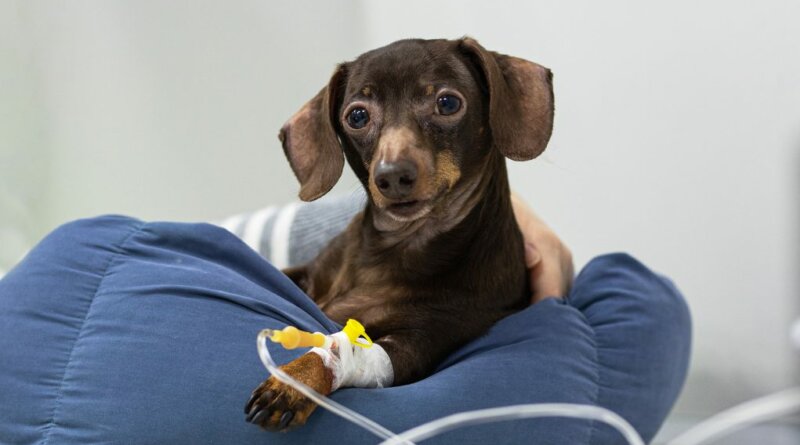Parvo in Dogs: Top 5 Home Remedies
[ad_1]
Parvovirus, or simply Parvo, is a highly contagious virus that primarily affects canines. Virus contamination happens when they get direct or indirect contact with contaminated material.
Since the virus spreads rapidly all over the dog’s body, it can be potentially fatal to the dog. As a result, it can even lead to death without notice.
Overall, the survival rate of dogs who acquired Parvovirus calculates between 68% to 92%. These dogs will recover completely; however, the virus will leave long-lasting effects such as kidney or liver damage.
Thus, if your dog has Parvovirus, it’s critical to take them to the veterinarian immediately. But then again, Parvovirus treatment can be pretty costly.
Hence, if you can’t take them to the vet, there are specific ways to treat your dog at home. This article will tackle the best home remedy for Parvovirus that you can do on your infected dog.
Stay tuned to know.

What Is Parvo In Dogs?
Parvovirus, also known as Canine Parvovirus Infection (CPV), is a highly infectious viral illness that can only be found and transmitted between the canid family members (including wolves and bears).
It is a virus that may afflict all breeds of dogs, regardless of size, weight, or age. However, it is more frequent among puppies and dogs that have not been immunized from this virus yet.
Breeds like Rottweilers, Pit Bulls, Labrador Retrievers, Doberman Pinschers, German Shepherds, and English Springer Spaniels have been particularly susceptible to the virus.
There are two distinct strains of canine Parvovirus: CPV-2a and CPV-2b.
The most severe cases associate themselves with CPV-2b. In contrast, CPV-1 exists in both diarrhoeal puppies and healthy dogs.
Besides these strains, it is critical to understand that there are two forms of Parvo.
The first one is the intestinal CPV, wherein its general symptoms are vomiting, diarrhea, weight loss, and loss of appetite.
On the other hand, the cardiac CPV damages the heart muscles, typically affecting young puppies, and is fatal.
Furthermore, once the dog gets infected with the virus, it will slowly weaken its immune system. As a result, the same dogs will become more vulnerable to other viruses or illnesses.
Consequently, you must be careful in isolating and keeping them away from other dogs.
Parvovirus is a highly infectious virus shared by dogs; thus, even after their recovery, they continue to risk other dogs for up to two months.
However, suppose your dog completely recovers from it; they should have developed immunity from Parvovirus if they reencounter it.
But that does not make them completely resistant to the said virus. Your dog will still be likely infected with it again in the future.

Causes of Parvo in Dogs
A puppy or dog contracts Parvovirus after being exposed directly or indirectly to the said virus. Two of the most common examples are playing with a dog who has the virus or sniffing an infected dog’s excrement.
Puppies are the most vulnerable to the virus due to their weak and vulnerable immune systems.
Hence, it would be best to be extra cautious when allowing your puppy out in the neighborhood to walk or play.
On the other hand, your dog can also contract Parvovirus through objects touched by a dog infected with the same virus.
Hence, it is critical to dispose of any item or material that may contain it.
However, if you cannot afford to throw these things yet, it would be best to clean them instead by using a powerful home bleach solution. Bleach is one of the proven chemicals that destroy the virus.
Nonetheless, Parvovirus may lie dormant for up to 8 months in outdoor situations. Furthermore, it appears to live much longer in cold and freezing environments than hotter ones.
As a result, it’s critical to remember that your dog can contract the virus on a regular walk or through a shoe or slipper that has trodden in infected feces.
Another essential aspect is that kennels or cages filled with many dogs might cause an infestation of the virus too.
Hence, if you’ve adopted a puppy from an animal shelter, your vet will advise you to re-vaccinate them against Parvovirus even if they were vaccinated once.

Symptoms of Parvo in Dogs
As aforementioned, when a dog or a puppy becomes infected with Parvovirus, it weakens their immune system. Thus, the decrease of their white blood cells.
This occurrence leaves them prone to other infections, diseases, and illnesses.
Parvovirus symptoms vary amongst dogs. Some pups and dogs will display obvious indicators and suffer greatly, while other dogs may not appear to be suffering.
One of the most noticeable signs of the Parvovirus is a distinct and heightened stench to your dog’s excrement. However, there are other symptoms such as:
- Blood in stool
- Diarrhea
- General Weakness and Lethargy
- Drastic weight loss
- Lack of appetite
- High Fever or Hypothermia
- Vomiting
- Rapid heartbeat
It is also normal for some canines to infect others despite showing no indications of disease.
Unfortunately, many dogs do not recover from Parvo. As a result, early discovery and specialized care are critical.
Suppose you suspect any of the symptoms described above or have yet to speak with a veterinarian. In that case, this should be your initial point of contact.

How Is Parvo Diagnosed in Dogs?
Your veterinarian will diagnose Parvovirus based on several medical examinations and tests, including blood, urine, x-rays, and ultrasounds.
An x-ray may reveal a blockage in the gut, whereas an ultrasound may reveal swollen lymph nodes or a fluid-filled intestine.
However, other tests like the ELISA or EIA test exists too. It is a test that detects and measures viral antigens in your dog’s blood or feces.
Other diagnostic tests may also be necessary. Your veterinarian will look for low white blood cell counts, increased liver enzymes, lymphopenia, and electrolyte abnormalities through these tests.

Treating Dogs: Home Remedies For Parvo
The most excellent home cures for Parvo in dogs and pups include the following:

Optimizing The Environment of Your Dogs with Parvo
When your dog is ill with Parvovirus, you should first provide a clean and comfortable environment to relax and rebuild strength.
To begin with, you must wash all of the items your dog uses, including bowls, crates, and toys. The Parvovirus and any strains that stick to these objects should be scrubbed and removed to keep them squeaky clean.
The majority of cleaning chemicals are ineffective against Parvo. However, using concentrated bleach may efficiently eliminate the virus.
You’ll want to apply this chemical generously, but you’ll also want to rinse the bleach away immediately after using it.
Put any blankets, towels, or bedding in the washing machine, mix them with your preferred detergent, and concentrate bleach before you turn them on at high temperatures.
If you fancy putting them in a dryer, you must also put them in the highest drier setting.
On the other hand, you have to clean up all dog waste in the garden regularly too. However, you must be extremely careful about how and where you dispose of it.
Furthermore, please keep your dog alone and away from other dogs and people while he is recovering.
You should avoid taking them to public places such as parks and beaches to decrease interactions with other dogs.
Limit your walks and plays to places where there are no dogs around. You can do this in your backyard or the nearest forest or lakes in town.
After such walks and plays, please provide them with a space to rest and relax. Furnish it with a couple of blankets and pillows to keep it warm and cozy.
In any case, make sure you take care of your dogs. It’s the only way to keep and get their wellness as soon as possible.

Proper Hydration of Your Dogs with Parvo
With Parvovirus, your dog or puppy will also suffer from dehydration. Thus, you must ensure that they are getting enough water, fluids, and electrolytes.
However, there will be times that your dog refuses to drink. In that case, you must have to be inventive to replace lost fluids.
Using dog-friendly water bottles and water fountains helps make the process easier and encourages them to drink.
They also allow your dog to acquire the necessary fluids even if they are sluggish and weak.

Garlic is said to work as a natural antiviral and immune booster for dogs with Parvovirus.
You can feed them to your dog when freshly minced by mixing it with their meal. However, you can also give the encapsulated cloves.
However, bear in mind that garlic doesn’t serve as a cure to Parvovirus, but only as a remedy.

Nutritional Support Through Diet For Your Dogs with Parvo
For many years, veterinarians and pet owners alike used a different approach to feeding dogs with Parvo: they didn’t feed them.
This standard treatment involves delaying meals for up to three days, hoping that a puppy’s digestive tract would heal.
Unfortunately, this technique had unfavorable outcomes, including intestinal discomfort known as “hunger pains,” impaired digestion, and even sepsis.
As a result, experts have established that feeding your dog is the best course of action based on various research.
Several studies showed that eating lowers inflammation, vomiting, and discomfort in dogs. Its data emphasizes the importance of getting your dog to eat, but they aren’t allowed to eat just any food.
Hence, the first thing you must keep in mind is to provide them with food that gives them an energy boost, such as honey, yogurt, and coconut oil.
From there, you can go to more solid meals. Boiled white rice is an excellent place to begin with, but make sure to have white rice because brown rice is more difficult to digest.
Raw egg yolks are also an excellent meal to offer to your dog at this period since it’s heavy in protein.
Tests have also shown that raw eggs include antibodies that fight the Parvovirus.
Beef and lamb liver are two more very healthy and nutrient-dense meals. You may boil it gently or serve it raw to them.

Specific Supplements As Home Remedies For Parvovirus
There are a variety of supplements that are useful in supporting your dog and restoring its immune system. Here are a few examples:
Vitamin C is an essential antioxidant that plays a vital function in resistant system maintenance. You may purchase Vitamin C fruit drops or tablets to feed your dog once or twice a day.
On the other hand, activated charcoal aims to aid in the removal of toxins and relieve digestive disorders. Just make sure to choose a reliable brand with fine powder and begin with a small amount before gradually adding it up.
Furthermore, Echinacea is an anti-inflammatory supplement available in soft chews, powder, and oil that can help relieve your dog’s upset stomach. Dogs can take them thrice a day, but they must not take it more than ten days.
Omega-3 fish oils work the same as the supplement above. Thus, following veterinarian treatment, you can add one capsule each day for up to two weeks.
There are other supplements out there to help your dogs relieve their Parvovirus.
However, the type of supplement you’ll use for your dogs primarily depends on your veterinarian’s recommendation and your dog’s preferred supplement.

Other Treatments for Parvovirus in Dogs
Treatment methods for dogs with Parvovirus usually differ depending on the severity of the dog’s illness.
Although supportive care and symptom management are among them, other treatment options are also available.
Dogs with Parvovirus frequently suffer from digestive problems. Thus, a hospital stay is a requirement for them.
An intravenous drip is suggested and needed during their hospital stay. This drip provides them with fluids and nutrients to replenish the massive amounts lost via vomiting and diarrhea.
Blood transfusions may also be beneficial in boosting low blood cell counts caused by Parvovirus infection on the bone marrow.
However, if intestinal bacteria have reached the blood circulation, antibiotics may be more effective for a dog suffering from Parvovirus.
Furthermore, anti-nausea and anti-diarrhea drugs might also be helpful at times.

Parvo Prevention In Dogs
Obtaining a Parvovirus vaccine for your dogs is one way to prevent your dogs from getting Parvovirus.
Typically, this vaccine gets administered along with other vaccines for different diseases such as Distemper, Hepatitis, and Parainfluenza.
Furthermore, they must get at least three doses or shots between a dog’s 6 and 16 weeks of age.
Once vaccinated, puppies should only associate with properly vaccinated dogs until they are entirely immune.
Thus, it would be best to avoid dog parks and other places where vaccination status is not guaranteed.
In addition, to be considered wholly vaccinated, a dog must have a booster vaccine at least once a year.
However, dogs should also be vaccinated every one to three years for the rest of their lives.

Can a Vaccinated Dog Get Parvovirus?
While no vaccination can guarantee 100% efficacy, the canine Parvovirus vaccine effectively provides excellent viral protection. A properly vaccinated dog is extremely unlikely to become sick with canine Parvovirus.
However, suppose a vaccinated dog comes into touch with a sick dog that is actively shedding Parvovirus. In that case, it’s likely for them to get the same virus, depending on the latter dog’s severity.
Thus, it would not be unreasonable to provide a booster shot of Parvovirus as soon as possible.
Can a Dog Get Parvovirus Twice?
While it is not impossible, a dog that has recovered from canine Parvovirus would rarely contract it again.
Parvovirus immunity lasts for several years. However, they still have to get vaccines against it because routine vaccines should be continuous.

Final Thoughts About Home Remedies For Parvo In Dogs
Parvovirus is a deadly virus that dogs can get through an infected dog, dog stool, or other object containing the disease.
Suppose your puppy or dog does develop the sickness; you don’t have to worry.
Although there’s no cure to it, the chances of survival are high, thanks to the vaccines and professional care your dog may receive.
That is, of course, provided you give them the best treatment they require as soon as possible, such as giving them the home remedies we’ve presented above.
NEXT READ: 5 Best Antiseptic Wipes for Dogs
Related
[ad_2]
Source link




